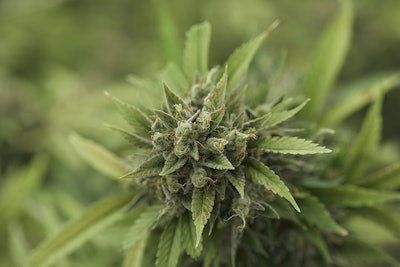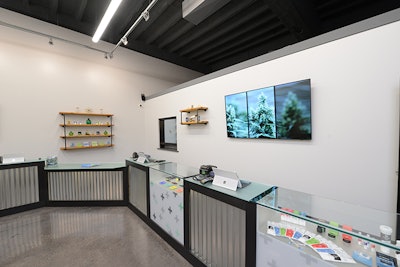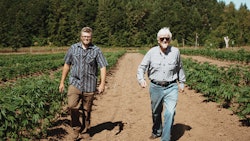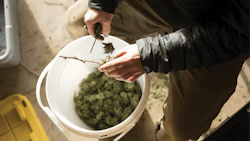
Illinois-based Cresco Labs is expanding into California, Arizona and Nevada, a culmination of years of building a solid foundation in the tightly regulated medical markets of Illinois, Pennsylvania and Ohio, according to CEO Charlie Bachtell.
California expansion allows Cresco to access one of the largest cannabis markets in the world, Bachtell says. “The other thing that we love about California is California is experiencing true regulated cannabis for the first time, and at the end of the day, I think Cresco Labs embodies what regulated cannabis is,” he adds. “That’s our foundation, that’s our background, and that’s how we came into the industry. We’re very excited to bring our brand of regulated cannabis to a developing regulated program in California.”
Cresco has partnered with one of the largest indoor commercial farming networks in California, Bachtell says, which will provide them with extensive greenhouse space that is already set up for agricultural production. “In Illinois, we built three buildings from the ground up—it was raw land,” he says. “Same in Ohio, [which] we’re doing right now. Pennsylvania was a retrofit of an existing building, but it was not an agricultural building—it was an old warehouse, and we had to convert it entirely for this purpose. It’s really nice to have a partner that has one of the most key fundamental components of your business operation, which is where are you going to grow this?”
Arizona’s highly regulated medical program has about 170,000 registered patients, making it one of the largest medical-only markets in the country, Bachtell says, with an opportunity to expand to adult-use. Cresco partnered with an existing operator in Arizona that was looking for a strategic partner to help it expand. Cresco will help provide the elements needed to go from one dispensary location to a larger presence in the state, Bachtell says.
Finally, Nevada will allow Cresco to access upwards of 40 million tourists per year in Las Vegas, Bachtell says—exposure that gives the industry an opportunity to showcase a professional and normalized cannabis market.
“The Nevada opportunity is great,” Bachtell adds. “An existing operator who had all three license types—dispensary, manufacturing, and cultivation—hadn’t operationalized the cultivation one.”
Cresco will join the existing operation in Nevada to help develop the cultivation component and bring its brand into the state’s market, Bachtell says.
Cresco strives to be vertically integrated in every state. It is currently waiting on approval for a manufacturing license in Ohio, and plans to execute acquisitions on the retail side in California.
“We like being vertically integrated,” Bachtell says. “Now that we’ve gotten to be vertically integrated in Illinois, Pennsylvania, and we will be in Ohio and Nevada, of course—and Arizona—we like the idea of the vertical integration for a lot of reasons. Total supply chain control—I like the control element of knowing that we grew that product and then we sold it to that patient or that customer, and we like retail.”
Retail offers interaction with the customer that can be rewarding, he adds. “There’s such a benefit that can come from this product with whoever’s using and really for whatever purpose,” Bachtell says. “But then also, it helps inform us of what the market feedback really is. When you’re not engaging with the end customer like you are at retail, as a cultivator and as a manufacturer, you’re relying on maybe anecdotal information or third-party info that you get back from the retailer, and it’s really nice to have that direct feedback from customers. We’ve made plenty of process and product changes based on direct customer feedback, which is pretty cool.”
Cresco aims to have products for sale in Nevada, Arizona and California in the fourth quarter of this year and the first quarter of next year, Bachtell says. The company is also trying to get its Ohio facility approved and operational, while it looks ahead to preserving the integrity and culture of what it has already built.
“That can be challenging as a company scales and as it moves away from headquarters and gets further away distance-wise and geographically,” he adds. “So, for that to continue to allow us then to normalize and professionalize cannabis on a national level—that’s really the long-term mission is to be that company that does help normalize and professionalize the industry.”

Winning Licenses with Blood, Sweat and Tears
Cresco achieved its western expansion through acquisition, which will become more common as the industry develops, Bachtell says. “If your intention is to be a multi-state operator, if that’s what you’re trying to do and you’re trying to build a company that has a national footprint, you’ve got to be able to win licenses and you’ve got to be able to acquire licenses,” he says. “There are states that aren’t going to issue additional licenses through an application process. You’ve got to figure out how to do mergers and acquisitions.”
This includes the ability to identify good potential acquisition targets and partners, and to develop either the business deal or the relationship, Bachtell says. Companies must also have the tools necessary for this, such as the required capital. “Just the act of being able to execute on acquisitions and mergers is an important skillset to be able to have if you’re trying to develop that national footprint,” Bachtell says.
Cresco was founded by a group of people who had previous careers in highly regulated industries before becoming involved in cannabis, which helped them understand how to navigate in a business environment that deals with different and challenging regulations from state to state, Bachtell says. The company’s success in the Midwest has demonstrated that it can execute on opportunities once the licenses have been won, he adds.
And those licenses have been secured through “blood, sweat and tears,” Bachtell says. “We’re pretty thorough thinkers and having that background in highly regulated industries. We were used to being audited,” he says. “We were in the banking industry before we did this. So, we look at the application process as very similar to what it was like to be audited by a federal regulator. You need to be able to put together the documentation and the information and the story—the narrative—in a way that makes sense to them, in a way that they want to see it. It has to be thorough, it has to be complete, it has to be thoughtful, and really that’s the outline of the direction and the projects that we developed for our applications—it’s a thoughtful, thorough process.”
If there are 25 reasons that a state wants to award a license to a company—whether that be the business’s security plan, cultivation plan or community relationship—Cresco wants to have a score of A- or higher in all 25 categories, Bachtell says.
“And then it also helps once you win one and you’re operational—then you’ve got proven concept and you can reference experience, and then you can reference what worked and what hasn’t worked and why it worked,” he adds.
This process has not been without challenges, however—the dichotomy between state and federal law, as well as the different regulations in each state, require problem solvers to create brands and footprints that are broader than their competitors, and who figure out how to meet challenges and overcome them, Bachtell says.
“This industry is nothing but problems, but one of our core values of our company is we like problem spotters and we like problem solvers,” he says. “Don’t be number one without being number two. You have to figure out how to solve problems because we’re creating a new industry, while at the same time we’re working to almost rehabilitate an industry that’s been around for a long time, and people might have negative preconceived notions about it.”

Forged in the Fires of Illinois
Cresco began in Illinois, where it secured one of the limited licenses in the state’s highly regulated, compliance-focused medical program. Illinois’ licensees are required to do it all, Bachtell says, from cultivation to manufacturing to retail. They’re even required to transport the product and handle distribution.
“We’re not allowed to bring any cannabis-related material or cannabinoids into our building, so I can’t import CBD and add CBD to my products—I have to grow it,” he says. “And then nothing can leave my facility unless it is tested, consumer-packaged in child-resistant packaging, tamper-evident and compliance labeled. That’s the model that all of these states, to a certain extent or another, are implementing. So, it forced us to start that way. Truthfully, I don’t know how to operate any other way than that soup-to-nuts model of having to handle all of it ourselves.”
Cresco likes the level of engagement that has been required to be successful in both Illinois and Pennsylvania, Bachtell says, and that model has become the way the company does business in all its markets, managing production, distribution, wholesale and retail while providing well-defined, diverse product offerings.
“Sometimes I say that we were forged in the fires of Illinois because it was a very difficult state,” Bachtell says. “That was a very difficult program, but it made everybody battle-tested, and if you’ve been able to be successful in a challenging market like Illinois and come out the other side successful, you’ve got a pretty good business model and background to be successful in other states. We focus a lot on brand, but it’s that value added, it’s that quality, it’s that messaging that I think will resonate in any market that we go into.”
It was in Illinois that Cresco saw an opportunity to create targeted brands based on market segmentation, Bachtell says. “We saw that there were going to be two major groups of customers in Illinois, whereas maybe in existing markets at the time—the pioneering markets out west—cannabis had one look and feel to it,” he says. “Culturally, it was a lot more accepted than it was going to be in Illinois.”
The company identified two main groups in the Illinois market—the patients who had already accepted cannabis, and the ones who had never tried it before but who were recommended it by their doctors.
“That made us look at what cannabis is, how cannabis should be marketed, how cannabis should be branded, how it should be packaged—it made us look at that differently than I think a lot of the existing operators in the existing markets needed to,” Bachtell says. “From day one, we worked on developing a brand suite, and we worked heavily—we put a ton of effort and focus and attention of developing messaging and marketing that was directed to the different market segments—the person who’s never tried it, the 65-year-old grandmother who swore she would never do this, to the consumer who’s already OK with it, to the connoisseur who’s going to participate in this program and is sophisticated and knowledgeable.”
Photos courtesy of Cresco Labs


























